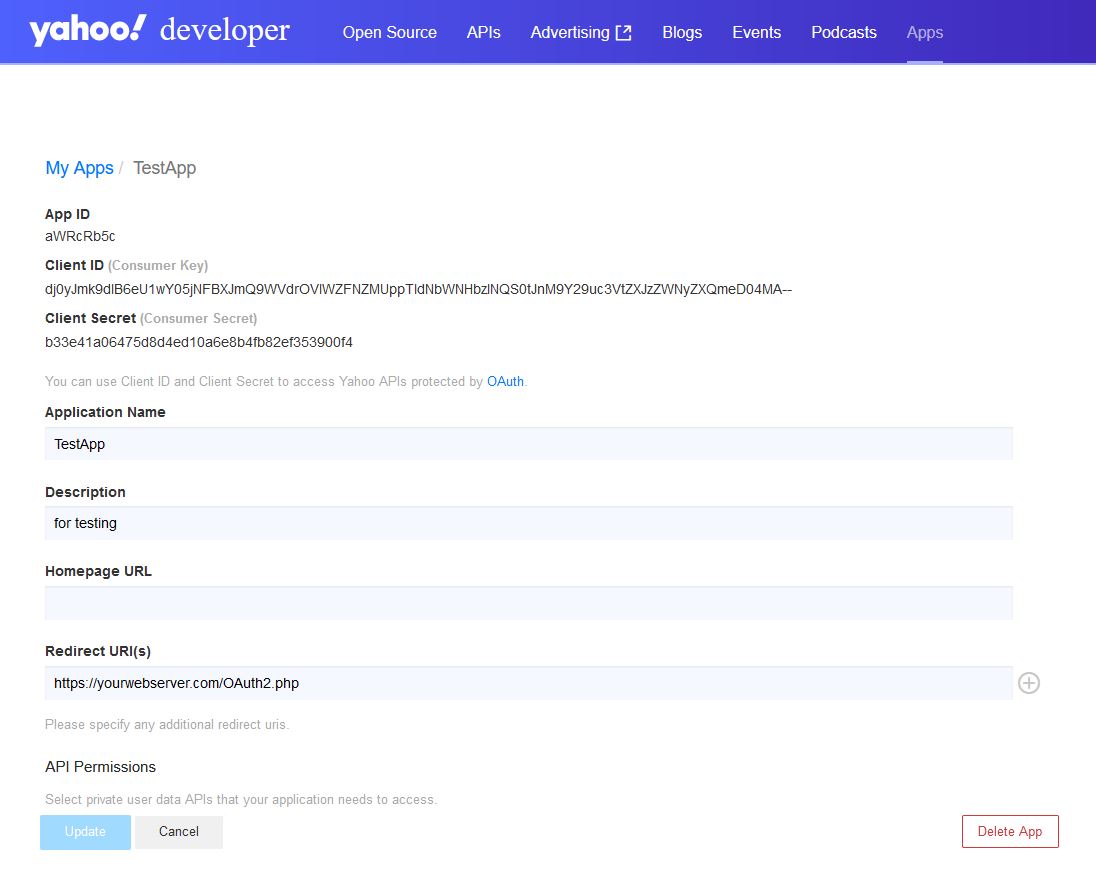|
|
(AutoIt) Yahoo Mail OAuth2 Access Token for Desktop App
Demonstrates how to get a Yahoo Email OAuth2 access token from a desktop application or script.Note: This example requires Chilkat v10.1.2 or greater. For more information, see https://developer.yahoo.com/oauth2/guide/
; First, you must define your app in Yahoo Developer (https://developer.yahoo.com/apps/) like this:
;  ; This example requires the Chilkat API to have been previously unlocked.
; See Global Unlock Sample for sample code.
$oOauth2 = ObjCreate("Chilkat.OAuth2")
; Your applicaton must use your own public web server as an intermediate
; to receive and forward the redirect to localhost.
; See Using Your Web Server as an Intermediary for OAuth2 Redirect to localhost
$oOauth2.AppCallbackUrl = "https://yourwebserver.com/oauth_redirect"
$oOauth2.ListenPort = 3017
$oOauth2.AuthorizationEndpoint = "https://api.login.yahoo.com/oauth2/request_auth"
$oOauth2.TokenEndpoint = "https://api.login.yahoo.com/oauth2/get_token"
; Replace these with actual values.
$oOauth2.ClientId = "CLIENT_ID"
$oOauth2.ClientSecret = "CLIENT_SECRET"
; Do not send the "scope" query param for Yahoo OAuth2.
$oOauth2.UncommonOptions = "NO_OAUTH2_SCOPE"
; Begin the OAuth2 Authorization code flow. This returns a URL that should be loaded in a browser.
Local $sUrl = $oOauth2.StartAuth()
If ($oOauth2.LastMethodSuccess <> True) Then
ConsoleWrite($oOauth2.LastErrorText & @CRLF)
Exit
EndIf
ConsoleWrite("url = " & $sUrl & @CRLF)
; Launch the default browser on the system and navigate to the url.
; The LaunchBrowser method was added in Chilkat v10.1.2.
Local $bSuccess = $oOauth2.LaunchBrowser($sUrl)
If ($bSuccess = False) Then
ConsoleWrite($oOauth2.LastErrorText & @CRLF)
Exit
EndIf
; Wait for the user to approve or deny authorization in the browser.
Local $iNumMsWaited = 0
While ($iNumMsWaited < 90000) And ($oOauth2.AuthFlowState < 3)
$oOauth2.SleepMs 100
$iNumMsWaited = $iNumMsWaited + 100
Wend
; If the browser does not respond within the specified time, AuthFlowState will be:
;
; 1: Waiting for Redirect - The OAuth2 background thread is waiting for the browser's redirect request.
; 2: Waiting for Final Response - The thread is awaiting the final access token response.
; In either case, cancel the background task initiated by StartAuth.
If ($oOauth2.AuthFlowState < 3) Then
$oOauth2.Cancel()
ConsoleWrite("No response from the browser!" & @CRLF)
Exit
EndIf
; Check AuthFlowState to determine if authorization was granted, denied, or failed:
;
; 3: Success - OAuth2 flow completed, the background thread exited, and the successful response is in AccessTokenResponse.
; 4: Access Denied - OAuth2 flow completed, the background thread exited, and the error response is in AccessTokenResponse.
; 5: Failure - OAuth2 flow failed before completion, the background thread exited, and error details are in FailureInfo.
If ($oOauth2.AuthFlowState = 5) Then
ConsoleWrite("OAuth2 failed to complete." & @CRLF)
ConsoleWrite($oOauth2.FailureInfo & @CRLF)
Exit
EndIf
If ($oOauth2.AuthFlowState = 4) Then
ConsoleWrite("OAuth2 authorization was denied." & @CRLF)
ConsoleWrite($oOauth2.AccessTokenResponse & @CRLF)
Exit
EndIf
If ($oOauth2.AuthFlowState <> 3) Then
ConsoleWrite("Unexpected AuthFlowState:" & $oOauth2.AuthFlowState & @CRLF)
Exit
EndIf
; Save the full JSON access token response to a file.
$oSbJson = ObjCreate("Chilkat.StringBuilder")
$oSbJson.Append($oOauth2.AccessTokenResponse)
$oSbJson.WriteFile("qa_data/tokens/yahooMail.json","utf-8",False)
; The saved JSON response looks like this:
; {
; "access_token": "kCVQdnOdul...LHucA--",
; "refresh_token": "AIenVXETSo0jklFBVkPS8vVm8E.Ej9ToRG.xDbDYmZ65WIs5t6CZhDrD",
; "expires_in": 3600,
; "token_type": "bearer",
; "xoauth_yahoo_guid": "HGDQCVF5JB4YDOWHITQJFBHCWA"
; }
ConsoleWrite("OAuth2 authorization granted!" & @CRLF)
ConsoleWrite("Access Token: " & $oOauth2.AccessToken & @CRLF)
; This example requires the Chilkat API to have been previously unlocked.
; See Global Unlock Sample for sample code.
$oOauth2 = ObjCreate("Chilkat.OAuth2")
; Your applicaton must use your own public web server as an intermediate
; to receive and forward the redirect to localhost.
; See Using Your Web Server as an Intermediary for OAuth2 Redirect to localhost
$oOauth2.AppCallbackUrl = "https://yourwebserver.com/oauth_redirect"
$oOauth2.ListenPort = 3017
$oOauth2.AuthorizationEndpoint = "https://api.login.yahoo.com/oauth2/request_auth"
$oOauth2.TokenEndpoint = "https://api.login.yahoo.com/oauth2/get_token"
; Replace these with actual values.
$oOauth2.ClientId = "CLIENT_ID"
$oOauth2.ClientSecret = "CLIENT_SECRET"
; Do not send the "scope" query param for Yahoo OAuth2.
$oOauth2.UncommonOptions = "NO_OAUTH2_SCOPE"
; Begin the OAuth2 Authorization code flow. This returns a URL that should be loaded in a browser.
Local $sUrl = $oOauth2.StartAuth()
If ($oOauth2.LastMethodSuccess <> True) Then
ConsoleWrite($oOauth2.LastErrorText & @CRLF)
Exit
EndIf
ConsoleWrite("url = " & $sUrl & @CRLF)
; Launch the default browser on the system and navigate to the url.
; The LaunchBrowser method was added in Chilkat v10.1.2.
Local $bSuccess = $oOauth2.LaunchBrowser($sUrl)
If ($bSuccess = False) Then
ConsoleWrite($oOauth2.LastErrorText & @CRLF)
Exit
EndIf
; Wait for the user to approve or deny authorization in the browser.
Local $iNumMsWaited = 0
While ($iNumMsWaited < 90000) And ($oOauth2.AuthFlowState < 3)
$oOauth2.SleepMs 100
$iNumMsWaited = $iNumMsWaited + 100
Wend
; If the browser does not respond within the specified time, AuthFlowState will be:
;
; 1: Waiting for Redirect - The OAuth2 background thread is waiting for the browser's redirect request.
; 2: Waiting for Final Response - The thread is awaiting the final access token response.
; In either case, cancel the background task initiated by StartAuth.
If ($oOauth2.AuthFlowState < 3) Then
$oOauth2.Cancel()
ConsoleWrite("No response from the browser!" & @CRLF)
Exit
EndIf
; Check AuthFlowState to determine if authorization was granted, denied, or failed:
;
; 3: Success - OAuth2 flow completed, the background thread exited, and the successful response is in AccessTokenResponse.
; 4: Access Denied - OAuth2 flow completed, the background thread exited, and the error response is in AccessTokenResponse.
; 5: Failure - OAuth2 flow failed before completion, the background thread exited, and error details are in FailureInfo.
If ($oOauth2.AuthFlowState = 5) Then
ConsoleWrite("OAuth2 failed to complete." & @CRLF)
ConsoleWrite($oOauth2.FailureInfo & @CRLF)
Exit
EndIf
If ($oOauth2.AuthFlowState = 4) Then
ConsoleWrite("OAuth2 authorization was denied." & @CRLF)
ConsoleWrite($oOauth2.AccessTokenResponse & @CRLF)
Exit
EndIf
If ($oOauth2.AuthFlowState <> 3) Then
ConsoleWrite("Unexpected AuthFlowState:" & $oOauth2.AuthFlowState & @CRLF)
Exit
EndIf
; Save the full JSON access token response to a file.
$oSbJson = ObjCreate("Chilkat.StringBuilder")
$oSbJson.Append($oOauth2.AccessTokenResponse)
$oSbJson.WriteFile("qa_data/tokens/yahooMail.json","utf-8",False)
; The saved JSON response looks like this:
; {
; "access_token": "kCVQdnOdul...LHucA--",
; "refresh_token": "AIenVXETSo0jklFBVkPS8vVm8E.Ej9ToRG.xDbDYmZ65WIs5t6CZhDrD",
; "expires_in": 3600,
; "token_type": "bearer",
; "xoauth_yahoo_guid": "HGDQCVF5JB4YDOWHITQJFBHCWA"
; }
ConsoleWrite("OAuth2 authorization granted!" & @CRLF)
ConsoleWrite("Access Token: " & $oOauth2.AccessToken & @CRLF)
|

